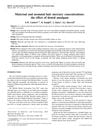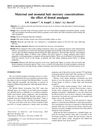 1 citations,
October 2016 in “Iranian journal of psychiatry and behavioral sciences”
1 citations,
October 2016 in “Iranian journal of psychiatry and behavioral sciences” Sertraline, an antidepressant, may rarely cause hair loss.
 October 2016 in “Iranian journal of psychiatry and behavioral sciences”
October 2016 in “Iranian journal of psychiatry and behavioral sciences” Sertraline, an antidepressant, may cause hair loss in rare cases.
146 citations,
September 2013 in “Advances in nutrition” Bariatric surgery can cause serious mineral deficiencies, requiring better patient education and monitoring.
 96 citations,
September 2021 in “International Journal of Molecular Sciences”
96 citations,
September 2021 in “International Journal of Molecular Sciences” Chitosan, a natural substance, can be used to create tiny particles that effectively deliver various types of drugs, but more work is needed to improve stability and control of drug release.
 68 citations,
January 2022 in “International Journal of Molecular Sciences”
68 citations,
January 2022 in “International Journal of Molecular Sciences” PCOS management includes lifestyle changes and medications, with ongoing research into repurposed drugs for better treatment options.
 16 citations,
June 2022 in “Agronomy”
16 citations,
June 2022 in “Agronomy” Certain natural biostimulants can increase lettuce yield and improve its nutritional content.
 16 citations,
November 2021 in “Antioxidants”
16 citations,
November 2021 in “Antioxidants” Managing oxidative stress might help treat low testosterone and related chronic diseases in aging men.
13 citations,
April 2019 in “International journal of molecular sciences” Acyzol could help treat conditions caused by zinc deficiency.
 13 citations,
January 2015 in “International Journal of Trichology”
13 citations,
January 2015 in “International Journal of Trichology” Higher lead and cadmium, and lower zinc and iron levels in the blood might be linked to chronic hair loss in women.
9 citations,
April 2018 in “Biology of reproduction” Diet changes hormone levels in pregnant ewes by affecting metabolism, not placental synthesis.
 6 citations,
April 2022 in “Biomedicine & pharmacotherapy”
6 citations,
April 2022 in “Biomedicine & pharmacotherapy” Using three different drugs together may better treat eye diseases like glaucoma and macular degeneration.
 4 citations,
January 2023 in “Frontiers in Medicine”
4 citations,
January 2023 in “Frontiers in Medicine” Zinc is important for skin health, and supplements can help treat various skin and hair disorders, but more research is needed for conditions like psoriasis and vitiligo.
2 citations,
October 2023 in “Biology” Cobalt is important for health but too much or too little can cause health problems, and its environmental buildup is a concern.
2 citations,
February 2023 in “International journal of molecular sciences” Tetrathiomolybdate reduces hair growth marker in skin cells by boosting harmful oxygen molecules, but effects can be reversed.
 1 citations,
July 2023 in “Foods”
1 citations,
July 2023 in “Foods” Mushrooms offer benefits for food, energy, and water security, and have potential uses in health and environmental applications.
 1 citations,
January 2023 in “Metabolites”
1 citations,
January 2023 in “Metabolites” Changes in gut bacteria can contribute to the development of Polycystic Ovary Syndrome (PCOS), affecting metabolism, immunity, and causing inflammation. Treatments may involve adjusting these factors.
 November 2024 in “Applied Sciences”
November 2024 in “Applied Sciences” Placenta products might help with hair loss, but more research is needed.

Nanocarriers with plant extracts show promise for safe and effective hair growth treatment.
 October 2023 in “Biomaterials”
October 2023 in “Biomaterials” Nanotechnology could improve hair regrowth but faces challenges like complexity and safety concerns.
 September 2023 in “Stem Cells International”
September 2023 in “Stem Cells International” Substances from fat-derived stem cells can promote hair growth and counteract hormone-related hair loss by activating a key hair growth pathway.
 January 2022 in “Sustainable development goals series”
January 2022 in “Sustainable development goals series” The document concludes that significant investment in agricultural innovation is necessary to achieve global food security and nutrition.
May 2004 in “Biochimica et Biophysica Acta (BBA) - Molecular Basis of Disease” Vitamin E affects liver metabolism, enhancing stress resistance, reducing blood clotting, and altering hormone processing.
 57 citations,
February 2014 in “Experimental Dermatology”
57 citations,
February 2014 in “Experimental Dermatology” Prostaglandin D₂ might be targeted for new male pattern baldness treatments.
 48 citations,
March 2003 in “BJOG: An International Journal of Obstetrics and Gynaecology”
48 citations,
March 2003 in “BJOG: An International Journal of Obstetrics and Gynaecology” Mothers and newborns with dental fillings had higher mercury in their hair, but getting fillings during pregnancy didn't raise mercury levels further.
 21 citations,
September 2017 in “Journal of Obstetrics and Gynaecology Research”
21 citations,
September 2017 in “Journal of Obstetrics and Gynaecology Research” Chromium supplements don't improve insulin, hormone levels, or cholesterol in women with PCOS but raise testosterone levels.
 March 2003 in “BJOG: An International Journal of Obstetrics and Gynaecology”
March 2003 in “BJOG: An International Journal of Obstetrics and Gynaecology” Mothers and newborns with dental fillings have higher mercury in their hair, but adding fillings during pregnancy doesn't raise mercury levels further.
 127 citations,
March 2004 in “Gynecologic oncology”
127 citations,
March 2004 in “Gynecologic oncology” Taking selenium supplements during chemotherapy may help reduce side effects and improve health markers in ovarian cancer patients.
 78 citations,
December 2011 in “Clinical toxicology”
78 citations,
December 2011 in “Clinical toxicology” Excessive selenium from a supplement caused toxicity but patients recovered with care.
76 citations,
April 2002 in “Urology” Selenium and vitamin E supplements have mixed effects on prostate cancer risk and may not be beneficial for everyone.






















